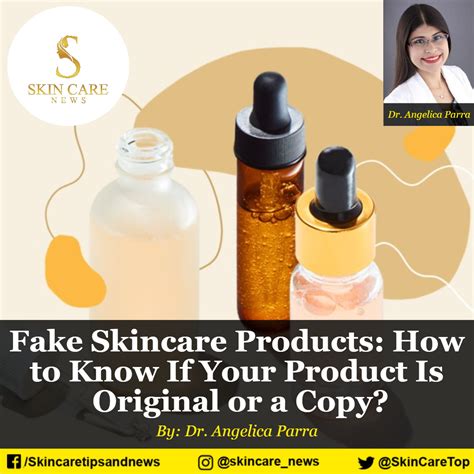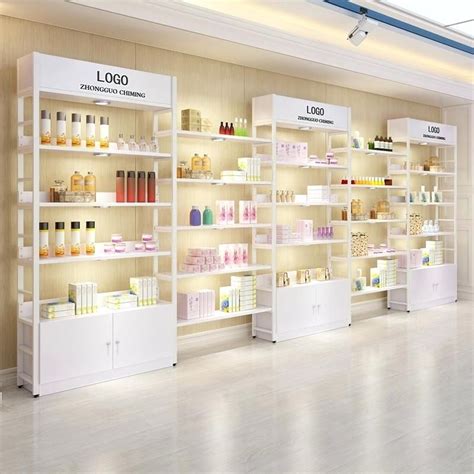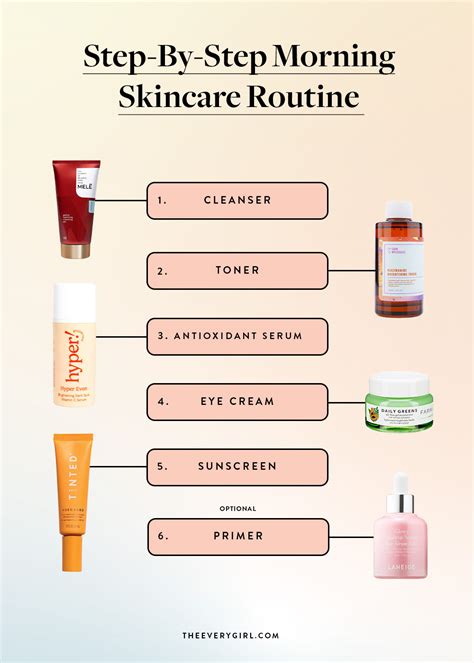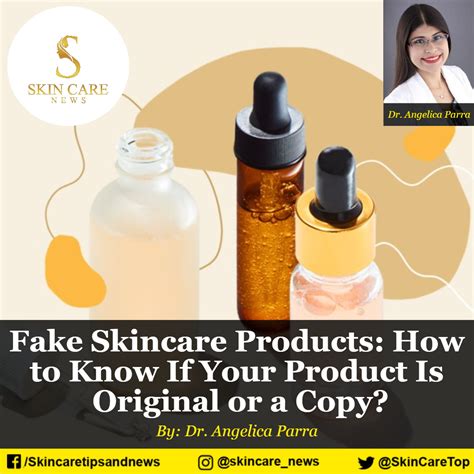How to Spot a Fake Skincare Product: A Comprehensive Guide
In the quest for healthy, radiant skin, we often turn to skincare products, hoping to find the magic potion that will erase wrinkles, banish blemishes, and give us that youthful glow. However, with the plethora of products available, it’s essential to be vigilant and discerning. The skincare industry, unfortunately, is not immune to counterfeiters, who prey on consumers eager for a quick fix. Recognizing a fake skincare product can save you from potential harm, wasted money, and disappointment. In this comprehensive guide, we’ll delve into the telltale signs of fake skincare products, equipping you with the knowledge to make informed choices.
Before we dive into the specifics, let’s understand the potential risks associated with using fake skincare products. Counterfeit products are often made with substandard ingredients, which can lead to various problems like skin irritation, allergic reactions, acne breakouts, and even more serious health concerns. Moreover, the lack of proper manufacturing and hygiene standards can introduce contaminants into the products, further increasing the risk of skin infections.
To protect yourself, be aware of the signs that might indicate a fake skincare product. By familiarizing yourself with these cues, you can make informed decisions and avoid potential hazards.

Signs of a Fake Skincare Product: How to Spot a Counterfeit
Identifying a fake skincare product requires a keen eye and attention to detail. While counterfeiters are constantly improving their techniques, there are still several common signs to look for.
Here are some key indicators that suggest a product might be fake:
- Unusually Low Prices: If a product is significantly cheaper than its genuine counterpart, it’s a red flag. Genuine skincare products often have high production costs, including ingredients, research, and quality control. Extremely low prices could indicate a counterfeit product.
- Packaging Discrepancies: Pay close attention to the packaging. Counterfeit products often have inconsistencies in the fonts, colors, logos, or printing quality. Compare the packaging carefully with the product’s official website or authentic product.
- Suspicious Seller: If the product is being sold from an unknown source, such as an online auction site or an individual seller, exercise caution. Legitimate skincare brands typically sell their products through authorized retailers and their own websites.
- Lack of a Batch Number or Expiry Date: Most reputable brands include a batch number and an expiry date on their products for quality control and traceability purposes. If these details are missing, it’s a major red flag.
- Unusual Texture or Smell: The consistency and scent of a skincare product should be consistent with its genuine version. If the texture is too thin or thick, or the smell is off, it could be a sign of poor quality or a fake product.
- Unrealistic Claims: Be wary of products that promise miraculous results overnight. Genuine skincare products often have realistic claims and emphasize gradual improvement over time.
- Grammatical Errors or Misspellings: Look out for spelling mistakes, grammatical errors, or inconsistent language on the product’s label or packaging. Counterfeit products often have poor quality control in their labeling and packaging.
- Fake Reviews: Beware of suspiciously positive reviews, especially if they appear on websites or social media platforms known for having fake reviews. Look for reviews from credible sources and independent reviewers.
- No Customer Service Information: Reputable brands usually provide customer service information on their products or packaging. If there is no contact information, it’s a sign that the product might be fake.
How to Avoid Buying Fake Skincare Products
Now that you’re armed with knowledge about identifying fake products, let’s explore strategies to avoid purchasing them altogether. These measures can significantly reduce the risk of falling prey to counterfeiters.
- Buy from Reputable Retailers: Stick to authorized retailers and the brand’s official website. This ensures that you’re buying genuine products with proper warranties and customer support.
- Compare Prices: Before making a purchase, compare prices from multiple retailers to ensure you’re getting a reasonable deal. Avoid suspiciously low prices.
- Read Customer Reviews: Scrutinize customer reviews from various sources, including independent review websites and online forums. Look for reviews that are detailed, specific, and unbiased.
- Research the Brand: Take the time to research the skincare brand before purchasing its products. Visit the brand’s website, check for certifications and awards, and read about their ingredient sourcing and manufacturing processes.
- Be Skeptical of “Too Good to Be True” Offers: Avoid products that make unrealistic claims or offer incredible discounts. Genuine skincare products rarely have excessive sales or promotions.
- Report Suspicious Sellers: If you encounter a suspicious seller or product, report it to the appropriate authorities or consumer protection agencies.

What to Do If You Suspect You Have a Fake Skincare Product
If you have reason to believe you may have purchased a fake skincare product, it’s essential to take steps to protect your health and avoid further complications. Consider these actions:
- Stop Using the Product: Immediately discontinue using the product if you suspect it’s fake. It’s better to be safe than sorry, as you don’t want to risk potential skin irritation or allergic reactions.
- Contact the Retailer: If you purchased the product from a retailer, contact them and express your concerns. Reputable retailers often have policies regarding counterfeit products.
- Report the Seller: If you purchased the product from an online marketplace or an individual seller, report the seller to the platform or authorities.
- Seek Medical Advice: If you experience any adverse skin reactions after using a suspected fake product, seek medical advice from a dermatologist or healthcare professional.
FAQs
What should I do if I’ve already used a fake skincare product?
If you’ve already used a fake skincare product and haven’t experienced any adverse reactions, it’s likely you’re in the clear. However, it’s still a good idea to stop using the product and switch to a reputable brand. If you experience any skin irritation, redness, or other issues, it’s important to seek medical advice from a dermatologist or healthcare professional.
How can I be sure that the skincare product I’m buying is genuine?
To be sure you’re buying a genuine skincare product, you should purchase it from an authorized retailer or the brand’s official website. Look for signs of authenticity, such as a batch number, expiry date, and consistent packaging. It’s also a good idea to check for customer reviews and compare prices from different retailers.
Are all skincare products sold online fake?
Not all skincare products sold online are fake. However, it’s important to be cautious and only purchase from reputable retailers and brands. Look for signs of authenticity and read customer reviews before making a purchase.
Can I use a fake skincare product if it’s cheap?
No, it’s never a good idea to use a fake skincare product, even if it’s cheap. Fake products are often made with substandard ingredients that can cause skin irritation, allergic reactions, and other health problems. It’s always better to invest in a genuine product from a reputable brand, even if it costs a little more.
How do I know if a skincare product is safe?
There’s no foolproof way to know if a skincare product is completely safe, but you can minimize your risk by following these tips:
- Choose reputable brands with a good track record.
- Read the product label carefully and pay attention to ingredients and warnings.
- Conduct a patch test before applying a new product to your entire face.
- If you experience any adverse reactions, stop using the product and seek medical advice.
What are the potential health risks of using fake skincare products?
Using fake skincare products can pose several health risks, including:
- Skin irritation: Counterfeit products often contain harsh chemicals and substandard ingredients that can irritate the skin.
- Allergic reactions: Fake products may contain ingredients that you are allergic to, leading to rashes, itching, and other allergic symptoms.
- Acne breakouts: Fake products can clog pores and contribute to acne breakouts.
- Skin infections: Counterfeit products are often produced in unsanitary conditions, which can introduce bacteria and other contaminants that can cause skin infections.
How can I tell if a skincare product is right for me?
To determine if a skincare product is right for you, consider your skin type, concerns, and preferences. Read product descriptions and reviews to understand its ingredients, benefits, and potential side effects. It’s also a good idea to consult a dermatologist or skincare professional for personalized recommendations.
Is it worth investing in expensive skincare products?
Whether or not expensive skincare products are worth the investment depends on individual needs, budget, and priorities. Some expensive products contain high-quality ingredients and offer advanced technologies that may deliver noticeable results. However, many affordable options also provide excellent benefits. Ultimately, it’s important to choose products that align with your skin type, concerns, and budget.

By being aware of these signs and following these guidelines, you can navigate the world of skincare products with confidence and make informed choices for healthier, radiant skin.
Table summarizing the information in the article:
| Sign of Fake Skincare Product | Description |
|---|---|
| Unusually Low Prices | Counterfeit products often have prices that are significantly lower than genuine products. |
| Packaging Discrepancies | Counterfeit products may have inconsistencies in font, color, logo, or printing quality on their packaging. |
| Suspicious Seller | Counterfeit products are often sold from unknown sources, such as online auctions or individual sellers. |
| Lack of Batch Number or Expiry Date | Genuine products usually include a batch number and expiry date for quality control and traceability purposes. |
| Unusual Texture or Smell | The texture and smell of a counterfeit product may differ from the genuine version. |
| Unrealistic Claims | Counterfeit products may make unrealistic claims about their benefits and efficacy. |
| Grammatical Errors or Misspellings | Counterfeit products often have poor quality control in their labeling and packaging, resulting in grammatical errors or misspellings. |
| Fake Reviews | Be wary of suspiciously positive reviews on websites or social media platforms that are known for having fake reviews. |
| No Customer Service Information | Reputable brands usually provide customer service information on their products or packaging. |
FAQ
What are some of the ingredients that are commonly found in fake skincare products?
Some of the ingredients that are commonly found in fake skincare products include:
- Hydroquinone: This ingredient is used to lighten skin, but it can be harmful in high concentrations and may cause irritation, redness, and even skin cancer.
- Mercury: Mercury is a heavy metal that can be toxic to the skin and body. It is often found in fake skin lightening products.
- Corticosteroids: These are powerful anti-inflammatory drugs that can thin the skin and make it more susceptible to infection.
- Unidentified chemicals: Fake products may contain unidentified chemicals that have not been tested for safety and efficacy.
How do I know if the skincare product I’m buying is genuine?
To be sure you’re buying a genuine skincare product, you should purchase it from an authorized retailer or the brand’s official website. Look for signs of authenticity, such as a batch number, expiry date, and consistent packaging. It’s also a good idea to check for customer reviews and compare prices from different retailers. Avoid suspicious sellers who offer products at drastically lower prices than those offered by reputable retailers.
Is it safe to use homemade skincare products?
Homemade skincare products can be safe if they are made with high-quality ingredients and proper hygiene practices are followed. However, it’s important to be aware of potential risks, such as allergic reactions or skin irritation. It’s always best to consult with a dermatologist or skincare professional before using homemade products, especially if you have sensitive skin or any existing skin conditions.
What are some tips for making safe and effective homemade skincare products?
Here are some tips for making safe and effective homemade skincare products:
- Use high-quality ingredients: Choose natural ingredients that are known to be safe for the skin, such as honey, aloe vera, and coconut oil. Avoid using any ingredients that you are allergic to.
- Follow a recipe carefully: Use a reliable recipe and follow the instructions carefully. Ensure that the ingredients are properly measured and combined.
- Use fresh ingredients: Use fresh ingredients whenever possible. Store ingredients properly and avoid using expired or contaminated products.
- Practice good hygiene: Wash your hands thoroughly before preparing any skincare product. Clean all utensils and containers that will be used in the process.
- Test on a small area of skin first: Before applying a homemade product to your entire face, test it on a small area of skin first. This will help you determine if you have any allergic reactions or sensitivities.
What are some common skincare myths?
Here are some common skincare myths that you should be aware of:
- Myth: You should wash your face multiple times a day: This is a common misconception. Overwashing can strip your skin of its natural oils, making it dry and irritated. It’s usually sufficient to wash your face twice a day, once in the morning and once in the evening.
- Myth: You need to use a lot of products: A complex skincare routine isn’t always necessary. Focus on using high-quality products that address your specific skin concerns. A simple routine that includes cleansing, moisturizing, and sun protection is often sufficient.
- Myth: You should scrub your face every day: While exfoliation is important, it should be done gently and not too frequently. Over-exfoliation can irritate and damage the skin. Aim to exfoliate 1-2 times a week.
- Myth: You should avoid oil-based products if you have oily skin: While oily skin may benefit from lighter, water-based products, some oils, such as jojoba oil and argan oil, can actually help balance oil production and improve skin health.
What are some tips for healthy skin?
Here are some tips for healthy skin:
- Cleanse your face twice a day: Remove dirt, oil, and makeup with a gentle cleanser that is suitable for your skin type.
- Moisturize regularly: Apply a moisturizer that is designed for your skin type. Choose a product that is oil-free if you have oily skin.
- Exfoliate 1-2 times a week: Remove dead skin cells with a gentle scrub or chemical exfoliant to reveal brighter, smoother skin.
- Protect your skin from the sun: Apply a broad-spectrum sunscreen with an SPF of 30 or higher every day, even on cloudy days.
- Eat a healthy diet: Eat plenty of fruits, vegetables, and whole grains, which provide essential vitamins and antioxidants for healthy skin.
- Drink plenty of water: Stay hydrated by drinking at least eight glasses of water per day. Water helps to keep your skin hydrated and supple.
- Get enough sleep: Aim for 7-8 hours of sleep per night. Sleep allows your skin to repair itself and regenerate.
- Manage stress: Chronic stress can lead to skin problems like acne and eczema. Find healthy ways to manage stress, such as exercise, meditation, or yoga.
Where can I learn more about skincare?
There are many resources available to learn more about skincare. You can:
- Consult a dermatologist or skincare professional: They can provide personalized advice and recommendations based on your skin type and concerns.
- Read reputable skincare websites and blogs: Look for websites and blogs that are written by dermatologists or other qualified skincare professionals.
- Watch educational videos on YouTube: There are many informative videos on YouTube that provide skincare tips and tricks.
- Join skincare communities: Connect with other skincare enthusiasts on online forums and social media groups to share information and learn from each other.
